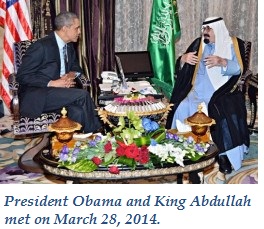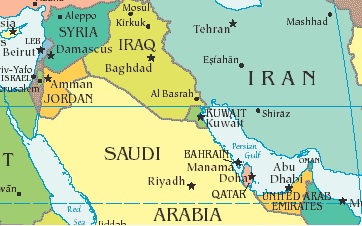Interview with David Ottaway by Faris Al Sulayman
What came out of President Obama’s trip to Saudi Arabia and discussions on pressing issues of mutual concern, especially on Iran nuclear talks?
Obama and King Abdullah agreed that their shared goal is to prevent Iran from gaining a nuclear weapons capability. But Saudi Arabia is perhaps more concerned about the implications of improved U.S.-Iran relations if a nuclear agreement is reached. The Sunni kingdom is worried about a tilt in U.S. foreign policy toward Shiite Iran at the expense of Saudi Arabia and the other Sunni sheikhdoms. Obama has said that he is willing to repair the U.S.-Iran relationship. But he has not spelled out what this might mean in practice and what other issues the two countries could cooperate on.
 Washington and Tehran were holding secret talks for a year starting with President Mahmoud Ahmadinejad then under President Hassan Rouhani. The Obama administration had not shared the content of those discussions with its Arab allies, which has raised enormous suspicions in the Gulf about U.S. intentions for Iran.
Washington and Tehran were holding secret talks for a year starting with President Mahmoud Ahmadinejad then under President Hassan Rouhani. The Obama administration had not shared the content of those discussions with its Arab allies, which has raised enormous suspicions in the Gulf about U.S. intentions for Iran. President Obama probably found it difficult to provide the kind of assurances that the Saudi leadership is seeking on Iran and nuclear negotiations.
What are the basic differences between the United States and Saudi Arabia on Iran?
The United States and Saudi Arabia appear to have different visions for solving the Iranian nuclear dispute. Saudi Arabia, much like Israel, wants Iran to relinquish its uranium enrichment capabilities or at least cap enrichment at 5 percent – far below weapons grade, or 90 percent. Riyadh also wants Iran’s existing stockpile of 20 percent enriched uranium to be shipped out of the country or turned into a form that cannot be used to fuel a weapon. But the United States and the other five major world powers negotiating with Iran – Britain, China, France, Germany and China – may be open to allowing Tehran to keep limited enrichment capabilities.
 Riyadh also wants Washington to take a much more aggressive role in ending President Bashar Assad’s rule in Syria. Damascus is Tehran’s closest ally in the Middle East, so the main battle ground between Saudi Arabia and Iran is Syria. Riyadh is keen on the United States providing more sophisticated arms — anti-aircraft missiles in particular—to opposition forces.
Riyadh also wants Washington to take a much more aggressive role in ending President Bashar Assad’s rule in Syria. Damascus is Tehran’s closest ally in the Middle East, so the main battle ground between Saudi Arabia and Iran is Syria. Riyadh is keen on the United States providing more sophisticated arms — anti-aircraft missiles in particular—to opposition forces. Washington and Riyadh also differ in their strategic approach to the Syrian conflict. Tehran has reportedly invested millions of dollars in Syria’s economy and provided training and arms to its army. So Saudi Arabia’s involvement in Syria is part of a wider effort to curb Iranian influence in the Sunni Arab world. The Sunni kingdom seems dedicated to rooting out the Alawite regime as a way to cut off Iran.
If the world’s six major powers and Iran reach an agreement that allows Tehran to continue enriching uranium, might Riyadh pursue its own nuclear program?
Saudi Arabia is further developing its relationship with Pakistan, which became the world’s first Muslim nuclear power in the early 1970s. Riyadh has already built a new center for medium range missiles, and it has a new generation of Chinese missiles. Saudi officials have also been speaking with Chinese military and political leaders.
If Tehran sprinted towards a nuclear weapons capability, Riyadh would likely call on Islamabad to provide warheads for those missiles – shortening the process of becoming a nuclear power. But Saudi Arabia is highly unlikely to enlist Pakistani help unless Iran pushes its program forward.
Military Balance

**
How are Saudi Arabia’s policies influenced by its relationship with the wider Islamic world?
First, Saudi Arabia sees itself as the religious leader of the Sunni Arab world. But it is increasingly trying to be the political leader because it has wherewithal to spend money on helping its allies. Saudi leaders feel vindicated by the failures of the Arab spring, and they would like to assert their political and financial weight in the Arab world. The problem is that they have little military throw weight. Saudi Arabia still depends on the United States for its military and security apparatuses and it has a limited ability to project force outside its borders.
Oil Balance

***
David Ottaway is a senior scholar at the Woodrow Wilson International Center for Scholars.
Faris Al Sulayman was a research assistant at the Woodrow Wilson International Center for Scholars from 2013-2014.
*Estimated spending, includes US Foreign Military Assistance via IISS
** Based on “The Gulf Military Balance” report by Anthony Cordesman and Bryan Gold. Click here for Cordesman’s chapter on Iran’s conventional military. Also see The International Institute for Strategic Studies’ annual assessment of worldwide military capabilities.
*** Based on US Energy Information Administration and OPEC data.
